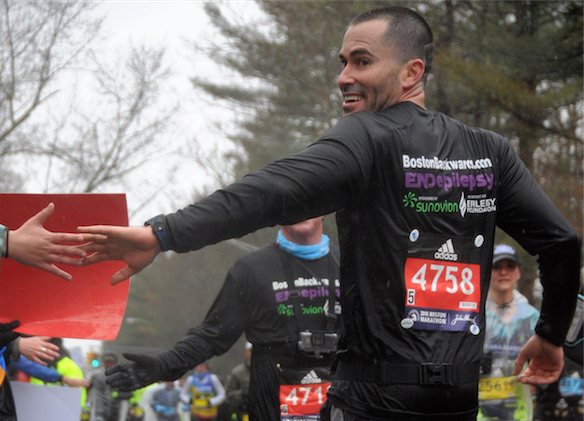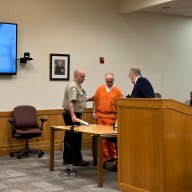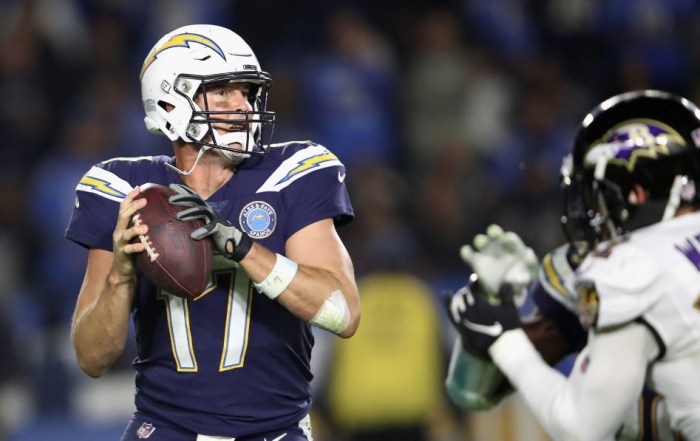Witnessing a loved one suffer a seizure is one of the more heartbreaking experiences you can have in life. No matter how much you want to help as a mom, dad, brother, sister, child or friend you’re typically rendered useless for 1-3 minutes that can feel like 1-3 hours.
Most families unfortunately do have to deal with seizures, as 1 in every 26 Americans will develop epilepsy in their lifetime. Epilepsy is not only dangerous for the individual suffering the seizures, but it can also tear families apart on multiple levels.
Before 34-year-old runner Loren Zitomersky was born, his father Steve Sitomer had to watch his 5-year-old son Brian suffer through epileptic seizures. Brian was placed on medication but when he was 7 his doctor took him off the meds, trying to see if he was cured.
“It was 1977, so times were different back then,” Zitomserky told Metro Boston. “Brian’s doctor took him off his medication over the course of maybe two weeks. Nowadays it would be over the course of six months. It would be a much longer period. So it was two weeks. It was very quick.
“My dad and his ex-wife were on a trip in Washington, D.C. and Brian went into something called status epilepticus, which was basically non-stop seizures in his sleep. As a result, he passed away.”
The death of his young son sent Steve into an emotional tailspin, needless to say.
“It was a really dark time for my dad and his ex-wife,” Zitomersky said. “I think it ultimately led to the break-up of their marriage. I think my dad was really lost for a couple of years there.”
Gradual healing
In a roundabout way, Zitomersky would never have been born had it not been for the death of his younger brother.
“Brian’s death led to the divorce and my dad ended up meeting my mom and having three boys, including myself,” Zitomersky, whose middle name is Brian, said. “In a weird way, something positive did come out of that time period I guess.”
When Zitomersky was 12-years-old his father approached him about doing a near 400 mile overnight bike ride from San Francisco to Los Angeles to raise money for the Epilepsy Foundation. For the past 22 years, Zitomersky and his father have done something every year to raise money for epilepsy research.
The fundraising finally culminated last year, with Zitomersky running the 122nd edition of the Boston Marathon.
Backwards thinking
At its core, “raising awareness” means standing out from the crowd. You see all kinds of funky outfits in the Boston Marathon each year as runners raise awareness for various diseases and efforts.
“I thought about what I could do on that stage, the Boston Marathon – the preeminent Marathon in the world – to stand out and raise money for epilepsy,” Zitomersky said. “I thought running backwards would certainly do that! So I started training out small running backwards to see if I could actually do it.
“I ran into a tree a couple of times. I fell a few times. I had to go to the hospital once. I sprained my foot,” Zitomersky, who qualified for the Marathon running forward, said. “I don’t really think the body is made to run backwards. There were just a lot of weird injuries I got that I didn’t get from running forward. My feet were probably the most affected. I could never really figure out the best running shoes. It’s just not natural and it really tore my body up, especially early on in the training. My calves were just ready to explode. My neck would hurt just because I would constantly have to look behind me.”
Zitomersky does say that there are some physical benefits to running backwards but that people should probably avoid long distance running while going in reverse.
“There was a Swiss study that said you use about 30 percent more energy running backwards than forwards, which seemed right because I would get exhausted much quicker. I was eating a lot more than my normal Marathon training. It takes a bigger toll on the body. A know a lot of crossfit athletes and professional athletes do drills backwards – it’s usually a lot of sprints, not long distance.”
Shooting for the world record
Zitomersky’s goal was to break the world record for running a Marathon backwards last year but he – and everyone else running – encountered some traditional early spring New England weather in the form of near freezing rain and incredibly gusty winds. The 2018 race was one of the worst runs, weather-wise, in the history of the event.
“I was so happy to be done,” Zitomersky said. “I was so cold. My hands were so swollen. It was the longest day of my life. It was the worst day of my life but the best day of my life all at the same time if that makes sense.”
Zitomersky did not break the world record. In fact he started slowing down midway through the race because the conditions were getting dangerous for regular runners, let alone ones who were going backwards.
His most memorable moment during the journey from Hopkinton to downtown Boston came about midway through when a blind runner came up beside him.
“I had a team with me to create a buffer because it’s such a congested race. I didn’t want to run into anybody,” Zitomersky said. “They could kind of help direct me. There are some blind runners in the Marathon too, and generally they’ve have a guide as well. So there was one blind runner and his guide said to him, ‘Hey, there’s backwards runner over here.’ And the blind guy says really loud, ‘A backwards runner?! That’s crazy … How can he see where he’s going?!’
“Everyone in the area had a really good laugh with that one.”
Crossing the finish line
Despite the elements, Zitomersky made it the entire 26.2 miles running backwards. He finished with a time of 5 hours, 43 minutes.
“Coming down the finish line at the Boston Marathon is just so cool,” Zitomersky said. “Even with the conditions, there were a ton of people cheering you on and it was just a very cool experience. There was a lot of emotion crossing the finish line because I was doing it for my brother and other people out there who have epilepsy.
“My dad told me that Brian was very smart for his age, and just a great kid,” Zitomersky said. “It was a very difficult loss. But as I said before good things can come from the bad. Raising money and awareness definitely helps.”
To donate to the Epilepsy Foundation please go to Epilepsy.com

















